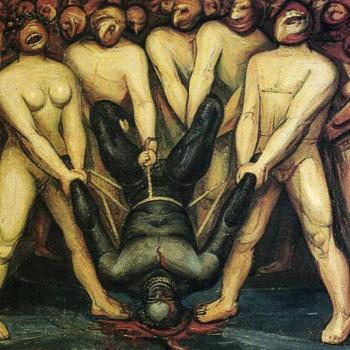
The Max Boot Chronicles
When I was taking a second spin through Berkeley in the early 1990s, Max Boot was an undergraduate writing pissant columns for The Daily Cal student newspaper. Max Boot stood out – to everyone. He was really smart. He was really conservative. And he had a fantastically authoritarian name. I disagreed with nearly everything he wrote, but loved reading it all. There was no doubt in my mind he would make his mark in the world.
I’ve tracked the arc of Max Boot’s career from a distance ever since, observing the animal spirits of his foreign policy youth gradually dissipate as he began to take the longer view historically, witnessed the failures of the wars in Afghanistan and Iraq, and pondered the pitfalls of endless war. A chastened neocon, Max is now, at the age of 49, a humbler and wiser version of his former self, which means the terrifying rhetorical and policy excesses of the Trump era distress and anger him, and the capitulation of other conservative intellectuals to the MAGA seductions of Trump’s maleficence enrage him.
We can also witness the arc of Max Boot’s evolution in the response of other conservatives of the National Review persuasion to his writings. Notably, the extremely bellicose (and execrable) Victor Davis Hanson praised Boot’s first book on military history, published in 1992 when he was 32 years old, as “well-written,” “fascinating,” and “didactic.” I quite doubt Victor Davis Hanson would lavish the same praise on anything Max Boot might write today.
On Monday, in a takedown epic for its virulence and contempt, the National Review’s John Hirschauer unleashed a torrent of abuse upon the new “woke” Max Boot, followed by an unyielding storm of shit from Hirschaer and his National Review and MAGA colleagues that has yet to dissipate.
What inspired this lovely pig pile?
- First, the proximate cause of the National Review outrage was an August 6, 2019 Max Boot opinion piece in the Washington Post that told white Americans to “get a grip,” and to appreciate that they are not now, and have never been, the victims of discrimination in any manner resembling what black Americans have experienced. Max Boots’ focus in this essay is on structural inequality, its long history, and the need for redress. For repair. He challenges the crouched, defensive, reactive posture of whites when asked to acknowledge the various meanings and impacts of white supremacy and white racism. The National Review’s conservative Catholic editorial origins and long-time commitment to Catholic natural law’s focus on the God-created individual soul as the locus of choice, virtue, and salvation makes Boot’s systemic analysis a bitter pill to swallow.
- Second, this brush fire had been smouldering for a while. In December, the National Review’s online editor, Charles Cooke, reviewed Max Boot’s latest and most disruptive book, The Corrosion of Conservatism: Why I Left the Right. In a sense, however, Cooke dismissed the book (giving it the Boot, as it were), for not being disruptive enough, for not risking anything of value. In the asymmetrical world of anti-Trumpers, Cooke wrote, those who dislike Trump but “care deeply about religious liberty, the protection of the unborn, the maintenance of the Second Amendment, the as-written constitutional order” are far more at risk than those such as the hawkish but otherwise liberal Max Boot, who dislike Trump but whose policy passions are far less likely to be violated by a lurch back toward the unsatisfying center. In other words, what pissed off Charles Cooke was that the cultural conservatives of the white Catholic demographic to which The National Review has committed itself since the days of William F. Buckley don’t have the Max Boot luxury of boycotting Donald Trump as if he were a mere Starbucks with another cafe across the street serving latte’s one preferred anyway. From this perspective, Charles Cooke dismisses the newly “woke” Max Boot, not because he is less conservative, but because he is less interesting.
- Third, John Hirschauer’s August 12 response to Max Boot’s Post essay shares some of this disdain for this “less interesting” Max Boot. Hirschauer is a “William F. Buckley Fellow in Political Journalism” for the National Review (“Buckley Fellow” appears to be the gussied-up title for a National Review intern). In his response, he bemoans Boot’s “Faustian choice for ‘white’ readers: Side with the white supremacists and their detestable program, or sell your political soul to Max Boot and become one of the self-loathing whites so paralyzed by intersectional deference.” Hirschauer would have preferred “a better set of options than white nationalism on the one hand and political impotence on the other. Surely there is a third way between a full-throated embrace of white identity and a supine adoption of the politics of self-hatred.” Which is not a meritless perspective, but which somewhat misses the point, because, as it turns out, what really irks Hirschauer is that Max Boot deploys a “totalizing racial language” that “stokes the flames of racial hatred.” In other words, Max Boot’s mortal sin is to adopt a level of analysis that implicates European-Americans as a class with the creation and mainteance of systems of wealth, law, and governance that have institutionalized racial inequality, leaving no space for European-Americans to wriggle free from this blanket Scarlet “R” by virtue of the way they position themselves in relation to the moral challenges of their times as individuals.
- Fourth, Boot’s reply to Hirschauer could have been more artful. Condemning white Americans as a class for not appreciating how they have benefited (and black Americans as a class have been harmed) by insitutional racism and then expecting National Review American Catholics – whose ark of the covenant has been a reading of Western history that emphasizes the centrality of the moral choices and catalogs of virtues of individuals – to not lose their shit when he tells them to “get a grip” is asking a bit much. But instead of reaching in his response toward an intellectual awareness of this predictable outcome – that systemic critiques of moral injustices, implicating people whose own existence is predicated on the high opinion they have on their own morality and virtue as individuals, will reliably cause these people to lose their shit – Max Boot retreats into his own crouched, defended posture of wounded outrage.
- Fifth, National Review promptly goes DEFCON 1, launching fusillades of outrage, scorn, contempt, and ridicule at Max Boot. Hirschauer makes three points worth mentioning: a) he immediately wraps his own beliefs in the phrase of choice for conservative Catholics defending their words and their honor: “I believe that white supremacy, in all its forms, is a sin against the Creator and His creation;” b) he asserts that “collectivization and mass imputation of guilt [to whites alone] would not withstand scrutiny if it were applied to any other group, nor should it,” a visceral reaction to a collectivizing analytics should surprise no one, given the National Review’s anti-communist, anti-socialist bona fides; and c) he rejects (almost certainly unfairly) the ex cathedra premises of the anti-intellectual position he believes Max Boot imposes on anyone who wants to debate political differences about what “redressing past wrongs” would look like in practice.
- Sixth, but matters really get jiggity when Charles Cooke, National Review editor Rich Lowry, and various fellow travelers such as Ricochet editor and Jewish Daily Forward columnist Bethany Mandel tear off their clothes and launch themselves into the fray. They hyperventilate about the besmirched honor of young Hirschauer (and by some weird process of transitivity, the venerated William F. Buckley himself, as Hirschauer is, we are reminded repeatedly, not simply an intern, but a Buckley Political Fellow). But what really cooks their goose, and properly so, I must admit, is Max Boot’s drive-by hit on an article published in the National Review way back in January.
American Jeremiad / Desecrations at the Altar of Impurity – Context
American Jeremiad – see Perry Miller, Errand into the Wilderness (Harvard University Press, 1956)
Impurity – see Mohsin Hamid on the rise of ethnic nationalism: ‘In the land of the pure, no one is pure enough’ (The Guardian, 2018)












